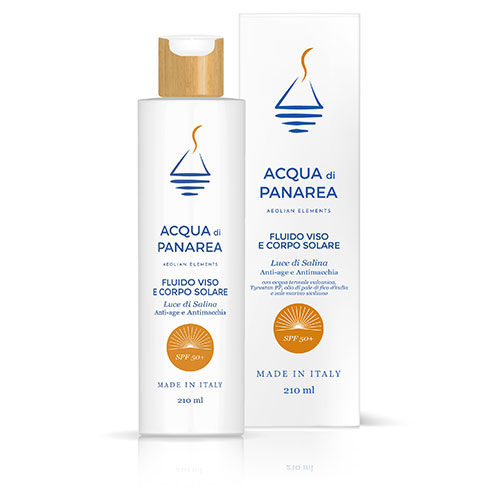Protect sensitive skin from sun exposure is an absolute necessity to preserve the health of your skin and to prevent long-term damage. Le sunscreens for sensitive skin are the ideal solution if you are looking for a effective sun protection and at the same time delicate, specific to your skin type.
These products are specially formulated for minimize the risk of irritation e allergic reactions, which can often arise in the presence of harsh chemical ingredients.
These are ingredients that are included in the INCI of many traditional sunscreens and that can damage your skin. For this very reason, if you have sensitive skin, you should avoid them and choose products that go not only to protect from UV rays but which are also able to provide a pleasant feeling of comfort without weighing down or leaving a residue.
That is precisely why we will help you choose the best sunscreens for sensitive skin, giving you a number of practical tips to identify the ones that best suit your needs. To have a daily protection and to make the most of the long summer days outdoors, find the best sunscreens for sensitive skin becomes essential in order to enjoy the benefits of the sun safely.
Our sunscreens for sensitive skin
Our sunscreens for sensitive skin are designed to provide a advanced sun protection, respecting the specific needs of delicate skin.
Ideal for those seeking a safe and effective solution against UV damage, these products combine high quality ingredients With dermatologically tested formulations. Perfect for daily use, they provide optimal protection while best protecting the skin.
As mentioned, choosing the best sunscreen products for sensitive skin is very important to protect your delicate skin from UV damage without causing irritation or allergic reactions.
Sensitive skin is more easily affected by the harmful effects of the sun, such as sunburn, premature aging e stains. In addition, many traditional sunscreens contain chemical ingredients that can worsen skin sensitivity, causing Redness, itching or rashes.
Sunscreens specifically formulated for sensitive skin, on the other hand, use gentler and often hypoallergenic ingredients, offering effective protection without compromising skin health.
Choosing for the best sunscreens, therefore, means preserving the beauty and well-being of your sensitive skin by providing complete and safe protection during sun exposure.
Light of Salina is in our product formulated to meet the needs of the sensitive skin and more prone to skin irritation, redness and sunburn.

This is a product carefully formulated with the best ingredients of natural origin to give your skin all the protection it needs.
Light of Salina is our sunscreen fluid for face and body with SPF 50+. Its peculiarity is to combine advanced protection and anti-aging treatment in one.
This is possible precisely because of its exclusive formulation, enriched with volcanic thermal water, which enables this fluid to provide effective protection from the sun's rays.
Its powerful antioxidants counteract spots and signs of aging. Luce di Salina is a product made entirely from natural, plant-based ingredients and therefore provides a daily defense against sun damage, keeping the skin hydrated, supple and radiant.
The mixture of UVA-UVB filters provides optimal shielding from the very first exposures, ideal for all skin types and, in particular, for the most sensitive skin. L'Argan oil deeply nourishes the skin, while the stem cells from red grapes promote cell regeneration, with powerful antioxidant action.
L'low molecular weight hyaluronic acid penetrates into the deeper layers of the skin, restoring firmness and reducing dehydration caused by UV exposure.
Our innovative thermal water of volcanic origin, rich in minerals and trace elements, soothes and protects the skin, making it soft and radiant even after a long day in the sun.
In addition, the exclusive melanogenesis activator, Tyrostan PF, stimulates melanin production, promoting a 'even and long-lasting tan, with natural UV protection.
Like all sunscreen products, it is important to apply before sun exposure. In the case of Saline Light, for optimal application, we recommend that you spread a small amount of fluid on your face and body, massaging in circular motions until fully absorbed.
Apply it 30 minutes before sun exposure and reapply frequently, especially after contact with water or in case of excessive sweating.
See also. Anti-stain facial sunscreens: how to choose the best ones
How to choose a cream for sensitive skin
Choosing a sunscreen for sensitive skin requires special attention. In fact, you will have to evaluate not only the protection it offers, but also the ingredients it contains.
Not only that. You will also need to consider how it fits with the specific needs of your skin. As mentioned, sensitive skin is indeed more prone to irritation, redness, and allergic reactions, which is why you will need to find the right product.
This is an essential step to avoid discomfort and to have a effective protection. The first thing to consider when you go to choose a sunscreen for sensitive skin is the product formulation.
Sunscreens can contain chemical and physical ingredients that, although effective against UV rays, can be irritating to delicate skin. Physical sunscreens, such as zinc oxide and titanium dioxide, are often preferred for sensitive skin because they act as a physical barrier that reflects the sun's rays, thus reducing the risk of adverse reactions.
These filters are less absorbable by the skin than chemical filters, which instead work by absorbing UV rays and turning them into heat. For sensitive skin, the physical filters are generally considered to be safer and less irritating.
Another aspect to consider when choosing a sunscreen for sensitive skin is the presence of soothing and moisturizing ingredients. Sensitive skin tends to be drier and easily prone to dehydration, especially under the sun.
Opt for sunscreens that contain ingredients such as thealoe vera, theargan oil or thehyaluronan can help keep skin hydrated and prevent dryness. Aloe vera is known for its calming and anti-inflammatory properties, while hyaluronic acid helps retain moisture, keeping skin soft and hydrated even during sun exposure.
Another important consideration is theAbsence of artificial fragrances, dyes and preservatives, which can trigger allergic reactions or irritation in more sensitive skin.
Therefore, the advice we give you is to look for Hypoallergenic and dermatologically tested products for sensitive skin. These products are formulated to minimize the risk of allergies and are generally free of harsh chemicals.
In addition to the ingredients, the sunscreen texture is a determining factor that you should always evaluate. Sensitive skin may react negatively to creams that are too heavy or occlusive, which may clog pores and cause irritation.
Lightweight, noncomedogenic formulations that do not clog pores are therefore preferable. These products allow the skin to breathe and reduce the risk of developing acne or other irritations related to excessive sweating under the sun.
Also theapplication of sunscreen is important. To effectively protect sensitive skin, you will need to apply the cream evenly and in sufficient quantities, covering all exposed areas, and reapply it regularly, especially after bathing or sweating. A sunscreen with SPF 50+ is the one we recommend for sensitive skin, as it offers high protection from UV rays, reducing the risk of sunburn and long-term damage.
Finally, it is important to remember that sunscreen for sensitive skin is not limited to summer or days of intense sun exposure. Even during cloudy days or colder seasons, UV rays can damage your skin. Therefore, we recommend that you incorporate sunscreen use into your daily skin care routine to keep your skin protected and healthy all year round.
Which ingredients should be avoided
When choosing a sunscreen for sensitive skin, it is crucial to pay attention to ingredients that could cause irritation or allergic reactions.
A first group of ingredients to avoid are the chemical sunscreens as oxybenzone and octinoxate.. These compounds, while effective against UV rays, are known to cause skin reactions in the most delicate skins.
Their ability to penetrate into the deep layers of the skin raises concerns not only for skin health but also for general health, especially in individuals with a predisposition to allergies.
See also. oxybenzone- and octinoxate-free sunscreens (things to know)
In addition, the synthetic fragrances pose another risk for those with sensitive skin. Although they are often added to make products more pleasant to smell, chemical fragrances can cause redness, itching and even contact dermatitis.
Similarly, the preservatives such as parabens, which are widely used to extend the shelf life of cosmetics, are known to interfere with the endocrine system and to be potential allergens.
Also thedenatured alcohol deserves attention, as it is often present in formulations because of its ability to make the product absorb quickly. This ingredient can excessively dry the skin, compromising the skin barrier and making it even more vulnerable to external agents.
Finally, the artificial dyes, used to enhance product appearance, can irritate sensitive skin and trigger unwanted reactions. Avoiding these ingredients helps significantly reduce the risk of irritation, ensuring safe and gentle sun protection for the most fragile skin.
See also. Paraben- and petrolatum-free sunscreens (things to know)
How to safely expose yourself to the sun if you have sensitive skin
Safe exposure to the sun is essential if you have sensitive skin, as your skin type is particularly vulnerable to UV damage.
To adequately protect sensitive skin and Minimizing the risk of sunburn, irritation and other issues, it is important to take a number of precautions and mindful behaviors.
The first key step is. Choosing the right time for sun exposure. The middle hours of the day, generally between 10 a.m. and 4 p.m., are when UV rays are most intense and therefore most dangerous to the skin.
If you have sensitive skin, we recommend avoiding exposure during these hours and prefer early morning or late afternoon, when the sun is less aggressive. This helps to significantly reduce the risk of skin damage and allows for safer exposure.
Wear protective clothing: This is another key strategy for protecting sensitive skin. Opt for light but opaque clothing, such as long-sleeved shirts and long pants in breathable fabrics, because this is one detail can make all the difference.
The use of wide-brimmed hats protects you not only your face, but also your neck and ears, often forgotten but extremely sensitive areas. The sunglasses with UV protection complete the protection, safeguarding the eyes and the delicate surrounding area.
Special attention should be paid to theuse of sunscreen. For those with sensitive skin, it is essential to choose a product with a high protection factor (SPF 50+), specifically formulated for delicate skin.
Sunscreen should be Applied evenly to all exposed areas, without neglecting areas such as the backs of the hands, ears and nape of the neck. It is important to Apply the cream at least 30 minutes before exposure and reapply every two hours, or more frequently if you sweat a lot or after every bath.
L'hydration plays a crucial role in protecting sensitive skin under the sun. Drinking plenty of water throughout the day helps keep the skin hydrated from the inside out, reducing the risk of dryness and irritation.
In addition, applying a light moisturizer before sunscreen can create a protective barrier on the skin, preventing dehydration caused by sun and wind exposure.
It is also useful monitor the time spent in the sun. Even if adequate protection is used, those with sensitive skin should limit the time of direct exposure to the sun, especially during the first few days of vacation or after a long period without exposure.
Gradually expose yourself to the sun, because this allows the skin to adapt better and reduces the risk of sunburn.
After sun exposure, it is equally important to take care of the skin. A fresh shower helps remove sunscreen residue, salt or chlorine, which can further irritate sensitive skin.
Then apply an after-sun or soothing cream., preferably made with aloe vera or other natural ingredients, can help calm the skin and reduce any redness.
What you need to be aware of before exposing yourself to the sun is your skin's reactions. If you notice signs of irritation, persistent redness or other abnormal reactions after sun exposure, it is essential to act promptly.
In these cases, immediately suspending exposure and applying a soothing product may help prevent the situation from worsening. In more severe cases, you may need to consult a dermatologist for specific advice and, if necessary, appropriate treatment.
If you have sensitive skin, we also recommend the following. avoid products that contain irritating ingredients, such as perfumes or alcohol, as they can aggravate the situation. Opt for products that are hypoallergenic, dermatologically tested, and free of harsh chemicals. This is always a wise choice.
Another tip is to maintain a healthy lifestyle with a balanced diet rich in antioxidants, as this can help strengthen the skin and make it less reactive.
The antioxidants, in fact, they help neutralize free radicals produced by sun exposure, protecting the skin from premature aging and cell damage.




